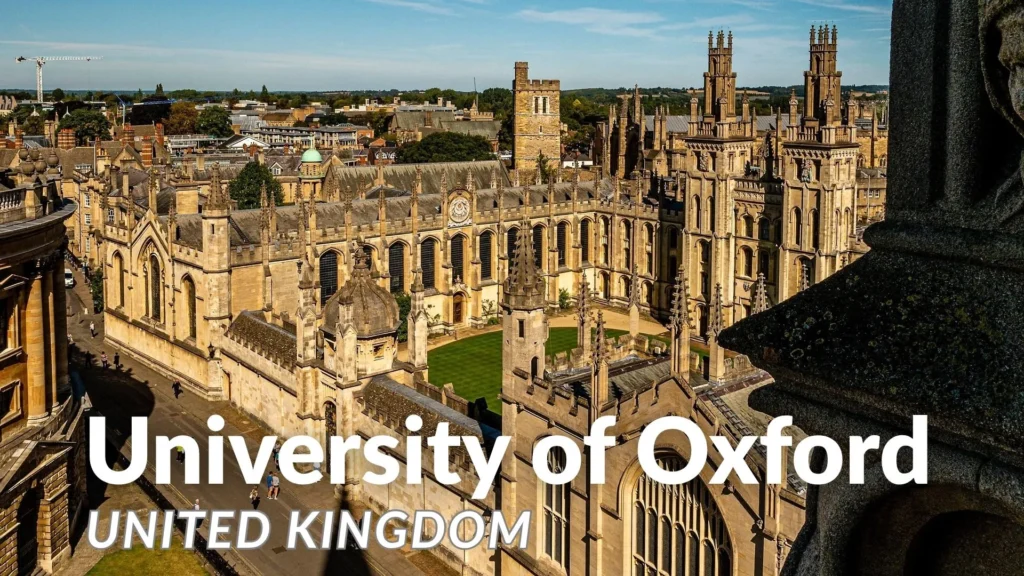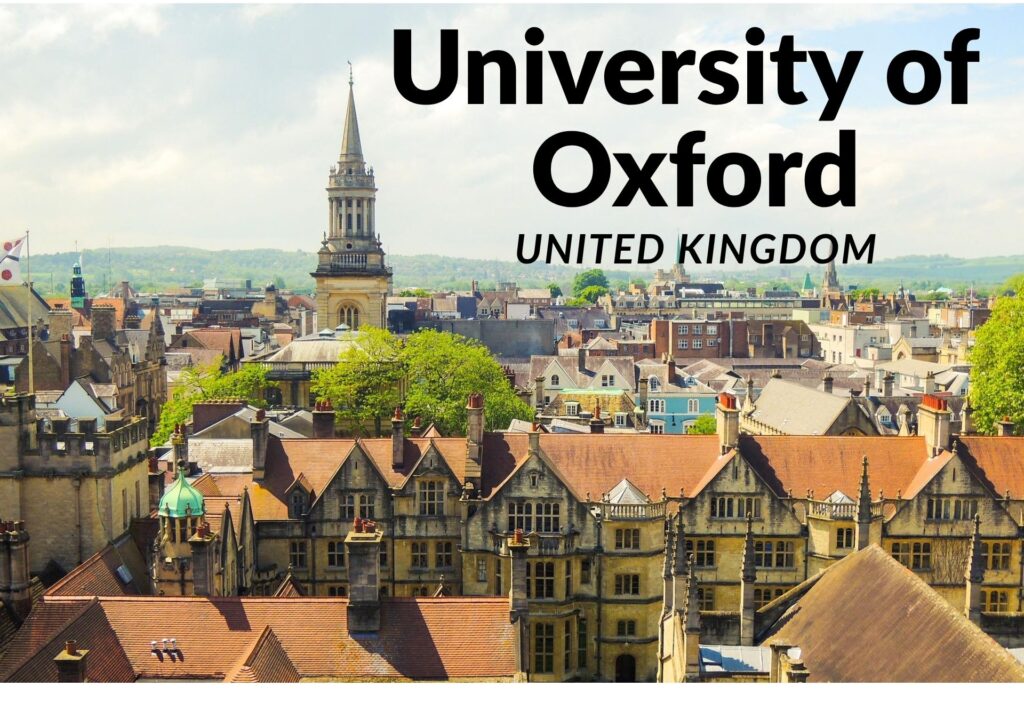University of Oxford United Kingdom
The University of Oxford, United Kingdom, stands as a pinnacle of academic excellence, blending a rich history with cutting-edge research and innovation. Renowned as one of the world’s oldest universities, Oxford has fostered generations of scholars, leaders, and innovators. Located in the historic city of Oxford, approximately 60 miles northwest of London, the university attracts students from around the globe who seek a transformative educational experience in the heart of the English-speaking world.
From its founding in 1096 to its contemporary global standing, Oxford embodies tradition, academic rigor, and cultural vibrancy, making it a prime destination for both undergraduate and postgraduate students seeking world-class education.
History of Oxford University
The University of Oxford traces its origins back to the 11th century, establishing itself as the second-oldest university in continuous operation. Over centuries, it developed a collegiate system, where self-governing colleges and permanent private halls maintain both academic independence and a shared commitment to scholarship and research.
Notable historic landmarks enrich the city, including the Bodleian Libraries, Ashmolean Museum, Sheldonian Theatre, and Cathedral of Oxford. Matthew Arnold famously referred to Oxford as the “dreaming spires”, capturing the city’s medieval charm and architectural beauty. Oxford’s historic city center, coupled with a youthful and cosmopolitan student community, makes the university a unique blend of tradition and modernity.

Academic Divisions and Departments
Oxford is organized into four main academic divisions, each excelling in its respective field:
- Humanities Division – covering arts, history, languages, and cultural studies
- Mathematical, Physical, and Life Sciences Division – encompassing mathematics, computer science, physics, chemistry, and biology
- Medical Sciences Division – leading in medicine, biomedical research, and public health
- Social Sciences Division – including economics, politics, education, and sociology
The university offers undergraduate teaching, postgraduate teaching, tutorials, seminars, lectures, and laboratory work, ensuring a research-driven educational experience. Departments and faculties are equipped with state-of-the-art laboratories, research grants, and collaborations with external organizations.
Colleges and Halls
Oxford University operates a collegiate system with 43 constituent colleges, 36 semi-autonomous colleges, and four permanent private halls. Each college provides a dining hall, common room, and library, creating a tight-knit academic and social community.
Undergraduates are guaranteed college housing during their first year, often extending into later years, while graduate students may access limited housing, particularly international students. This structure fosters a personalized learning environment, blending academic mentorship with social engagement.
Courses and Programs
The University of Oxford courses cover a wide spectrum of disciplines, from Humanities and Mathematical Sciences to Medical Sciences and Social Sciences. Popular programs include:
- Undergraduate degrees in philosophy, engineering, computer science, medicine, and law
- Postgraduate programs including MSc, DPhil, and specialized courses in AI, biotechnology, and global health
- Research-focused graduate scholarships such as the Rhodes Scholarship
Oxford’s academic calendar is divided into three terms: Michaelmas (Fall), Hilary (Spring), and Trinity (Summer), each lasting eight weeks. All instruction is conducted in English, ensuring accessibility for international scholars.
Admissions and Requirements
Oxford University admissions are highly competitive, reflecting the institution’s academic excellence. Key points include:
- University of Oxford acceptance rate is selective, with only a fraction of applicants admitted
- Requirements for international students include strong academic records, language proficiency, and relevant qualifications
- How to apply to Oxford University: submit an online application, complete any required tests, and attend interviews
- Application deadline 2026: prospective students should check official timelines for accurate submission dates
Financially, tuition fees vary for EU and non-EU students, and the university provides over 900 scholarships for graduate students, often funded through departments, colleges, and external organizations.
Research and Innovation
Oxford has a strong global reputation for research and innovation. With £778.9 million in research grants and contracts in the fiscal year 2024, the university advances knowledge across multiple domains, including medicine, AI, biotechnology, and environmental sciences.
Notable achievements include contributions from alumni and scholars such as Stephen Hawking, Tim Berners-Lee, Richard Dawkins, and global leaders like Bill Clinton, Aung San Suu Kyi, and Indira Gandhi. Oxford has produced:
- 76 Nobel Prize laureates
- 4 Fields Medalists
- 6 Turing Award winners
- 160+ Olympic medalists
The university continues to foster cutting-edge research through collegiate laboratories, academic departments, and partnerships with external organizations worldwide.
Rankings and Recognition
Oxford consistently ranks among the top three universities in the world. Key highlights include:
- #4 in Best Global Universities
- #1 in Europe and the UK
- Excellence in Arts and Humanities, Infectious Diseases, and Mathematics
- Top-ranked programs in Medicine, Computer Science, Economics, and Social Sciences
The Oxford vs Cambridge rivalry, famously showcased in The Boat Race, symbolizes both universities’ pursuit of academic and sporting excellence, fostering a friendly competition that drives achievement.

Student Life and Campus Experience
Studying at Oxford provides more than just academics. The city of Oxford is home to:
- Historic buildings and iconic landmarks along the River Thames
- Vibrant arts and music culture, including jazz, classical, and folk genres
- University drama scenes, societies, and extracurricular activities
Approximately 40% of Oxford University students are international, contributing to a cosmopolitan campus atmosphere. About a quarter of the city’s residents are students, creating a youthful and energetic community immersed in both tradition and innovation.
Career Opportunities and Alumni Network
Oxford’s alumni network exceeds 250,000, spanning Prime Ministers, Nobel laureates, Fields Medalists, Turing Award winners, and world leaders. Graduates often pursue careers in:
- Government and diplomacy
- Scientific research and innovation
- Business and entrepreneurship
- Arts, literature, and cultural leadership
The university’s reputation, global recognition, and strong alumni network provide unparalleled career opportunities and mentorship, making it a springboard for future leaders worldwide.
Conclusion
The University of Oxford, United Kingdom, stands as a beacon of academic excellence, historical heritage, and global recognition. From its 11th-century origins to modern-day research innovations, Oxford offers an unmatched educational experience combining rigorous academics, vibrant student life, and a rich cultural environment.
With world-class colleges, diverse programs, and a tradition of producing leaders and innovators, Oxford continues to define the standard for higher education globally. Whether you aspire to study undergraduate courses, pursue postgraduate research, or explore scholarship opportunities, the University of Oxford remains a destination for excellence and lifelong learning in the heart of the English-speaking world.
